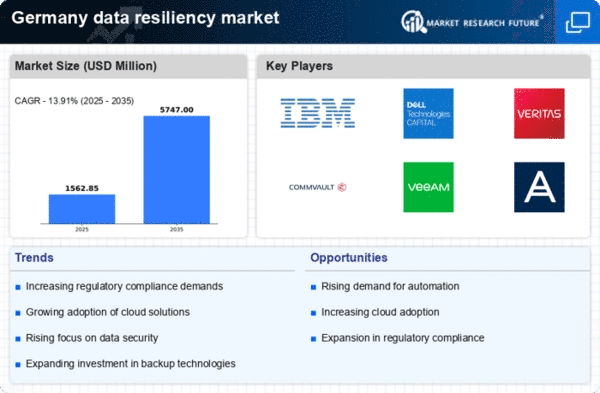Regulatory Compliance Pressures
In Germany, stringent regulatory frameworks such as the General Data Protection Regulation (GDPR) impose significant compliance requirements on organizations. These regulations necessitate that businesses implement effective data resiliency measures to avoid hefty fines and reputational damage. The data resiliency market is experiencing growth as companies strive to align their data management practices with these legal obligations. As of 2025, it is estimated that compliance-related investments in data resiliency solutions will account for nearly 30% of the total market expenditure. This trend indicates that organizations are not only focusing on operational efficiency but also on adhering to legal standards, thereby driving demand for innovative data resiliency solutions that ensure compliance while safeguarding data integrity.
Rising Awareness of Cybersecurity Threats
The escalating awareness of cybersecurity threats among organizations in Germany is significantly influencing the data resiliency market. As cyberattacks become more sophisticated, businesses are compelled to adopt comprehensive data resiliency measures to protect their critical assets. In 2025, it is estimated that nearly 40% of organizations will prioritize investments in cybersecurity-related data resiliency solutions. This growing concern over data breaches and ransomware attacks is prompting companies to reassess their data protection strategies. The data resiliency market is thus likely to witness increased demand for solutions that not only safeguard data but also provide rapid recovery options in the event of a cyber incident. This heightened focus on cybersecurity is expected to drive innovation and investment in the data resiliency market.
Growing Demand for Data Protection Solutions
The increasing reliance on digital infrastructure in Germany has led to a heightened demand for robust data protection solutions within the data resiliency market. Organizations are increasingly recognizing the necessity of safeguarding their data against potential breaches and losses. In 2025, the market for data protection solutions is projected to reach approximately €3 billion, reflecting a growth rate of around 15% annually. This surge is driven by the need for businesses to maintain operational continuity and protect sensitive information. As cyber threats evolve, companies are investing in advanced data resiliency strategies to mitigate risks. The data resiliency market is thus positioned to benefit from this growing awareness and investment in data protection, as organizations prioritize the security and integrity of their data assets.
Technological Advancements in Data Management
Technological innovations are playing a pivotal role in shaping the data resiliency market in Germany. The advent of advanced data management technologies, such as cloud computing and artificial intelligence, is enabling organizations to enhance their data resiliency strategies. These technologies facilitate real-time data backup, automated recovery processes, and predictive analytics, which are essential for minimizing downtime and data loss. By 2025, it is anticipated that the integration of these technologies will drive a substantial portion of the market growth, with an expected increase of around 20% in the adoption of AI-driven data resiliency solutions. This trend suggests that organizations are increasingly leveraging technology to bolster their data management capabilities, thereby enhancing their overall resilience.
Increased Focus on Business Continuity Planning
The emphasis on business continuity planning in Germany is becoming increasingly pronounced, particularly as organizations recognize the potential disruptions caused by various factors, including natural disasters and cyber incidents. The data resiliency market is responding to this need by offering solutions that enhance organizational preparedness and recovery capabilities. In 2025, it is projected that investments in business continuity solutions will constitute approximately 25% of the overall data resiliency market. This focus on continuity planning reflects a broader understanding of the importance of maintaining operations during crises. Companies are likely to adopt comprehensive data resiliency strategies that encompass backup solutions, disaster recovery, and risk management, thereby reinforcing their resilience against unforeseen challenges.
















